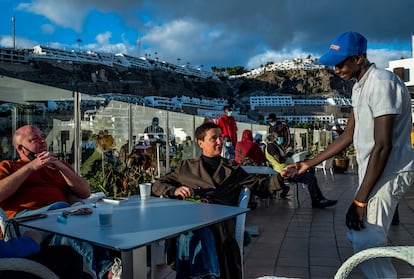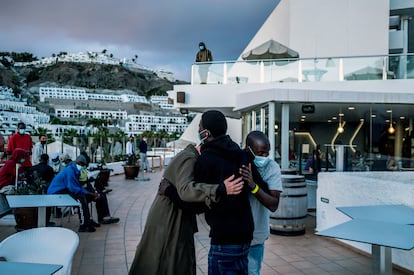‘Opening our hotel to migrants revolutionized our lives’
Briton Calvin Lucock and his Norwegian wife Unn Tove Saetran talk to EL PAÍS about how the experience of sheltering hundreds of boat arrivals has dismantled their prejudices


Calvin Lucock drives his Mercedes 4x4 at full speed to one of the four hotels that his company runs in Puerto Rico, one of the most popular tourist destinations in the south of Gran Canaria, in Spain’s Canary Islands. The coronavirus curfew is approaching and the streets are deserted. Most of the hotels in this area are empty. Lucock is a stout 47-year-old from the United Kingdom. Next to him in the passenger seat is his Norwegian wife Unn Tove Saetran, 51, who owns three restaurants on the island. She wears a green trench coat and her eyes are shining, like they always do lately. They park the car, and before they are even at the doors of the resort, two little kids from Mali are clinging to them, a Moroccan man is telling them about his day, and a group of migrants from Senegal is waving at them from their balcony. It’s been five months now since their lives were turned upside down.
It’s the first time that we are doing something that we feel has any sense. The other things were just for moneyCalvin Lucock, managing director of Holiday Club
It all began last summer. Lucock, the managing director in the Canary Islands for the hotel company Holiday Club, sat down with his team. It was a critical meeting. The coronavirus pandemic was devastating the tourism sector: travel restrictions, quarantine rules and contagion fears had led to record-low numbers of visitors. And there was no sign of the pandemic letting up. Due to the lack of tourists, the company would be forced to put its more than 100 workers on the government’s ERTE furlough scheme. Meanwhile, Lucock had been watching as migrants continued to arrive, only to find themselves stuck at the port facility in Arguineguín, a village of 2,500 residents that is part of the tourist town of Mogán on Gran Canaria.
Last year, around 41,000 migrants arrived by land and sea in Spain, of which more than 20,000 were received by the Canary Islands. The surge put the region, located off the northwestern coast of Africa, under enormous strain, forcing authorities to improvise temporary shelters in schools, hotels and ports, such as the one in Arguineguín.
As the tourism situation on the island became increasingly dire, Lucock decided to join the other hotel businesspeople who had decided to offer accommodation to the growing number of migrant arrivals. “It was a financial decision,” he says. “I had to reactivate the business.”

On September 12, the first migrants arrived at Puerto Calma, a resort run by Holiday Cub with a pool and sea views, where more than 400, men, women, teenagers and children are currently staying. Although the couple were convinced it was the best decision for the company, they admit that they had their fair share of worries and prejudices. They wanted the new guests to be treated with the same care and friendliness as typical tourists, but they also took extra safety precautions.
“It was a step into the unknown,” says Lucock. “Who would stay with us? How would they behave? Would they be violent? We had the same fears that I understand others have due to a lack of knowledge.” The two laugh at themselves when they remember how they removed a cactus from the entrance to the hotel, fearing that it could be used as a weapon in a fight. “That very day [when the first migrants arrived] our way of thinking and our perspective on life began to change,” says Saetran. “Fifty scared, freezing and desperate young people got off that bus after sleeping for days on the ground at the port in Arguineguín.”
Migrants continued to arrive by boat to the island, and Holiday Club, which receives €42 a day for every person, offered a second hotel to accommodate them. In theory, the owners and managers of the tourist complexes that take in migrants in the Canary Islands are only responsible for renting the space and managing staff. But Lucock and Saetran have ended up putting their heart and soul into helping their new guests. They began to spend an increasing amount of time at the hotel, sorting out dozens of needs that had gone unaddressed. One day they are buying clothes, coats and shoes, the next, they are in the consulate. They have asked their own lawyer to help with asylum requests and they offer emotional support to deeply traumatized people who have never seen a psychologist.
A helping hand
The couple remembers how their 16-year-old daughter hugged a woman who, after being held in quarantine in a room for two weeks, began to talk to the mirror. “It was the first time that she had opened the door, and we were very worried about her,” says Saetran.
At Puerto Calma’s outdoor café, and later in an email, she recounts the stories of some of the hotel guests. Such as Ayoub, a 19-year-old from Morocco whose family lives in a garage without electricity or water; or Osman, from Senegal, who suffered abuse after being disabled in a car accident; Ibrahima, a 16-year-old teen from Gambia, who spent nine days on a boat to reach the archipelago, watched three of his friends die on the journey and had to toss their bodies into the ocean. Then there is Yousef, a child from Morocco with no family whose autism has gone ignored; and Abdelhak, who is seriously disabled and cannot walk without help.
“We have been very successful,” says Lucock. “We have been traveling for 10 years, going to the best hotels and restaurants. We didn’t realize that we have everything, or what world we were living in. But these months have revolutionized our lives. It’s the first time that we are doing something that we feel has any sense. The other things were just for money.”
The couple’s home is often open to anyone who needs it – youngsters who want to play PlayStation or the child who was evicted from the hotel for behaving badly. Sullaiman, a youth from Sierra Leone who saw his parents killed when he was six, has also joined the family.
The situation is a far cry from what has been seen in some migrant shelters in Gran Canaria, where tensions continue to soar. Locals blame undocumented immigration for what they say is a rise in crime – a point refuted by authorities – and have organized several protests under the banner: “There aren’t enough beds for so many people.” Migrants, on the other hand, have been targeted by vigilante groups and fear leaving their shelters. Fears of deportation have also led some to self-harm.
None of the migrants want to be in a hotel or to depend on the state. They just want to move forward, to begin their livesCalvin Lucock, managing director of Holiday Club
“It would be naive to say that there are no tensions. There are tensions in any big group of people and we have people who have been here for five months. They are desperate,” says Lucock. The couple decided to speak to EL PAÍS because nearly six months have passed since the first bus arrived at Puerto Calma, and their now-friends remain in limbo. They want the authorities to do more. “We understand perfectly the difficulty of managing this situation, but the fact is that the people are already here and we have to do something,” says Lucock. “Not doing anything with 9,000 people is not an option. I understand that deportation is part of the solution, and sadly it will be the end of the journey for many of them. But we also have to work at integrating those who will not be sent back.
“And this has to be done now,” he continues. “They can’t continue to stay in hotels and camps. Why don’t they allow those who have family in Europe to travel? None of them wants to be in a hotel or to depend on the state. They just want to move forward, to begin their lives.”
English version by Melissa Kitson.
Tu suscripción se está usando en otro dispositivo
¿Quieres añadir otro usuario a tu suscripción?
Si continúas leyendo en este dispositivo, no se podrá leer en el otro.
FlechaTu suscripción se está usando en otro dispositivo y solo puedes acceder a EL PAÍS desde un dispositivo a la vez.
Si quieres compartir tu cuenta, cambia tu suscripción a la modalidad Premium, así podrás añadir otro usuario. Cada uno accederá con su propia cuenta de email, lo que os permitirá personalizar vuestra experiencia en EL PAÍS.
¿Tienes una suscripción de empresa? Accede aquí para contratar más cuentas.
En el caso de no saber quién está usando tu cuenta, te recomendamos cambiar tu contraseña aquí.
Si decides continuar compartiendo tu cuenta, este mensaje se mostrará en tu dispositivo y en el de la otra persona que está usando tu cuenta de forma indefinida, afectando a tu experiencia de lectura. Puedes consultar aquí los términos y condiciones de la suscripción digital.








































